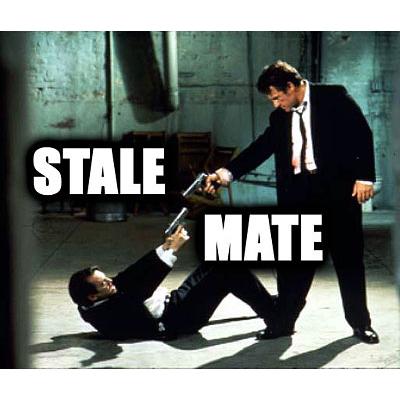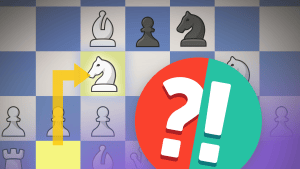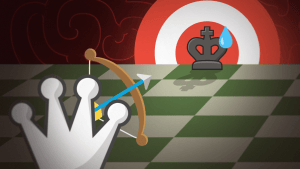
It's a Miracle!
Imagine a chess position where you have almost your whole army and your opponent has just a lonely king. The game is practically over and yet he just keeps playing. Even if you blunder some of your pieces and pawns, there is still no chance for him to survive. What he is hoping for? A stalemate!
Image: Thoughts from the Line
Countless games played by inexperienced chess players ended this way. That's why I always remind beginners: whenever your opponent has no pieces or pawns left, check that his king has moves because a stalemate is the last hope a losing side can have in such a situation. "But I am not a beginner and will not miss a stalemate in thousands of years!" many of you could say. Well, believe me or not, but such miracles even happen in the games played by the strongest chess players! Here is one notorious example:
Yes, it was just a blitz game, but according to some sources Kasparov still had more than a minute on his clock when he played his last horrible move. As the result of this blunder, Kasparov got eliminated from the first World Blitz Championship!
Of course this game is a major exception and usually stalemates in the games of grandmasters happen as a result of a combination, like in another game of Kasparov:
In most of the cases, if you just remember that a miracle called stalemate does exist in chess, you'll be able to successfully avoid such a disaster. Unfortunately, it is exactly in those moments when we have a decisive material advantage that we all have a habit to relax prematurely, thinking that the game is over and our opponent "is about to resign any move now".
Here is what Kasparov wrote in his book How Life Imitates Chess about the final position of the last game from his World Championship Match vs. Karpov: "After another ten moves of steady squeezing, I began to feel the win was in the bag. Karpov's pieces were pinned up against the wall, and a little more maneuvering would lead to decisive material gain." And at this precise moment, Karpov resigned. Let's see what could have happened if the game continued:
So if Karpov didn't resign after 64. Kg2 and kept playing, there was a good chance that he would have saved the game because Kasparov admitted that he didn't see the stalemate during the game. Then Karpov would have returned his chess crown (it was the last and decisive game of the match!) and chess history would be absolutely different! Unfortunately for Karpov, he didn't see the stalemate trick either!
Personally I believe that Kasparov would fall into this trap. My reason is not even that he was very tired towards the end of the match or that he relaxed prematurely because he thought that the game was over. The real reason is the chess disease called 'stalematis'. It affects very strong chess players and strikes within the same time intervals.
So, in 1986 it was Kasparov's game vs. McDonald, one year later it was his game vs. Karpov and one year after that his game vs. Georgiev. You've never heard of this strange disease and its weird symptoms? Here is what happened to one of the best American grandmasters, Samuel Reshevsky:
It was not doubt very painful to draw a game with three extra pawns, but look what happened 11 years later:
And then 10 years later:
And then 10 years later... Just kidding! After a lot of suffering Reshevsky was finally cured of this dangerous disease!
(To be continued...)

